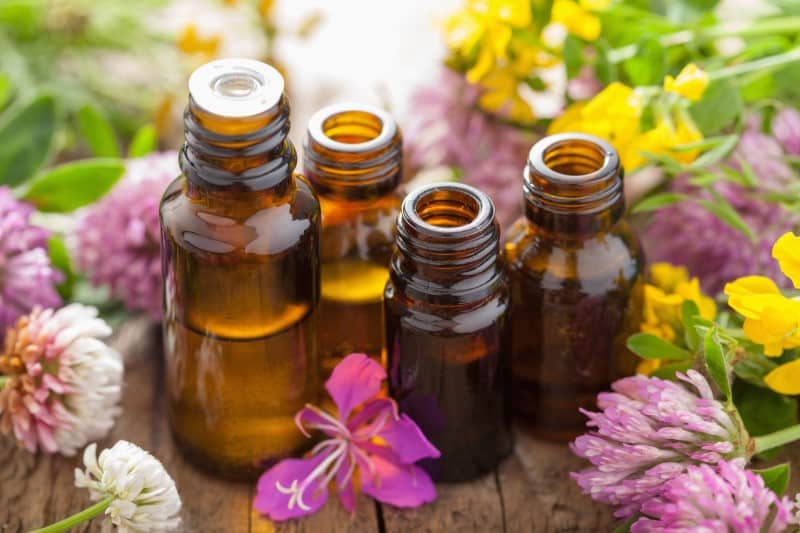Essential oils are concentrated plant extracts. They are used in perfumes, cosmetics, and aromatherapy. They are used to promote health and well-being and can even be used as a natural alternative to pharmaceuticals for some medical conditions.
Essential oils can be extracted from the plants through steam distillation, in which steam passed through the plant draws out the oils. The oils are then collected once the steam condenses. Cold pressing can also be used to extract essential oils through the mechanical action of squeezing.
Essential oils are extremely volatile, and therefore they evaporate easily. Molecular size, temperature, surface area, and air circulation affect the rate of evaporation. There are steps to take to minimize unwanted evaporation. Evaporation affects the diffusion of essential oils.
The medicinal properties of essential oils depend largely on the specific oil, but all essential oils have similar physical properties. Essential oils are strongly aromatic, colorless liquids at room temperature; they are lipid-soluble but not water-soluble, and they are extremely volatile.

What Causes Essential Oils To Evaporate?
Essential oils are very volatile. Volatility measures the ease with which a substance vaporizes; therefore, essential oils can easily evaporate. Evaporation is the process whereby substances change from their liquid phase to their gaseous phase. Why does this happen?
In a liquid such as an essential oil, the molecules are always moving, although they move at different speeds. Some move slowly, and others move quickly. These molecules are always bumping into each other, the sides of the liquid container, and the surface of the liquid. The surface of a liquid exerts a pressure known as surface tension. If a molecule is moving fast enough when it hits the liquid’s surface, it will have enough energy to overcome the surface tension, escape the liquid, and become a gas.
How Quickly Do Essential Oils Evaporate?
The rate at which essential oils evaporate depends on a number of factors.
Molecular size affects the rate of essential oil evaporation. Molecules of essential oil escape as a vapor when they have enough energy to overcome the oil’s surface tension. This energy is related to the speed at which the molecules are moving. Larger molecules are heavier and require more energy to reach the necessary speeds for evaporation to take place.
Temperature affects the rate of essential oil evaporation. Increasing the temperature of the essential oil increases evaporation. This is because it increases the kinetic energy of the essential oil molecules, and they move faster. The faster the molecules move, the easier it is for them to overcome the surface tension and escape into the atmosphere in the gas phase.
Surface area affects the rate of essential oil evaporation. Evaporation occurs at the surface of the essential oil liquid. A greater surface area increases the likelihood of the moving essential oil molecules hitting the surface and escaping.
Air circulation affects the rate of essential oil evaporation. Essential oil vapors can saturate the air directly around the container, which will reduce the opportunity for new evaporation. If there is constant air circulation, it increases the rate of essential oil evaporation by sweeping the saturated air away from the container and replacing it with “fresh” air into which the oils can evaporate.
What Does Evaporation Mean For Diffusion Of Essential Oils?
Essential oils are added to machines called diffusers, which disperse the essential oils into the air. The faster the essential oils evaporate, the faster their aroma fades. This means that the aroma from lighter oils will last a short time, while the aroma from heavier oils will linger.
Light-weight essential oils include Balsam Fir, Cedarwood, Eucalyptus, Grapefruit, Peppermint, and Lemon. These produce what are called top notes, and they do not last long.
Medium-weight essential oils include Cyprus, Germanium, Ginger, and Rose. These produce what are called middle notes, which provide a steady aroma.
Heavy-weight essential oils include Cumin, Myrrh, and Sandalwood. These produce what are called bottom notes, and their aromas last for a long time.
Read our full review about:
- Best Ceramic Diffusers
- Best Nebulizer Diffusers
- Best Ultrasonic Diffusers
- Best Glass Essential Oil Diffusers
How To Prevent Unwanted Evaporation Of Essential Oils
There are six easy ways to minimize unwanted evaporation of your essential oils:
- Ensure that the caps are tightly screwed onto the bottles when you are not using them. Due to the volatility of essential oils, it means that they will always be evaporating. If you keep the bottles tightly sealed, the only amount that can evaporate is the amount that fully saturates the small pocket of air between the oil and the lid.
- Replace the caps as soon as you have used the oils. This will limit the time that the oil is exposed to a large amount of air into which it can evaporate.
- Do not remove the reducer lid, which only allows one drop of oil to come out at a time. This little fitment also reduces the amount of essential oil vapor that can escape while the bottle is open.
- Keep the bottles away from sources of light and heat. As discussed earlier, heat increases the molecules’ kinetic energy, thereby increasing the frequency with which molecules can overcome the surface tension.
- Decant your essential oils into smaller containers. This is particularly important if you have bought a bigger bottle of essential oil, which you have used down to the halfway point or lower. Remember that the volatile essential oils will saturate the air they have access to. There is more air to saturate in a bigger, half-empty bottle than in a smaller bottle.
- Minimize the frequency with which you open your essential oil bottles. The oil molecules that evaporate inside the essential oil bottles are lost whenever you open the lid. To minimize this loss, try not to open your essential oils too often, even if they do smell great.
Other Problems Associated With Leaving Essential Oil Bottles Open
In addition to evaporation, essential oils can react with oxygen in the air. Oxidation of essential oils alters their properties and affects their consistency and aroma. Moisture can also get into your bottle of essential oil if it is left open. Water droplets will taint the oil.
You can easily knock over an essential oil bottle. If the bottle is open or partially open, it will spill onto the floor or surface on which it is sitting. Essential oils are expensive, and so this accident can cost you a lot of money. The oils can also stain and damage furniture, which is a further cost.
If the bottles get knocked over when you are not around, your pets or children could come into contact with the oil. Essential oils are corrosive and can cause chemical burns when they come into contact with skin before being diluted. Additionally, pets and children could ingest the oil and corrode the much more sensitive mucous membranes of their digestive tracts.
Proper Storage Of Essential Oils
Evaporation is not the only problem you can have with essential oils. They can also be degraded or even dangerous if stored improperly.
Store your essential oils in a dark spot. As mentioned previously, direct sunlight can degrade the oil. To help minimize light exposure, essential oils are kept in amber or cobalt-colored bottles instead of clear bottles.
Store your essential oils in a dry spot because water droplets can taint essential oils. Rooms such as laundry rooms and bathrooms are poor locations for storing your oils because they are often humid.
Always ensure that the caps of your essential oil bottles are tightly screwed on to help prevent oxidation, evaporation, and moisture contamination.
Do not store your essential oils in the car, near open flames, or around any heat sources such as radiators, ovens, stovetops, and space heaters. Not only will the heat promote evaporation, but essential oils are flammable, and the bottles may explode.
Conclusion
Essential oils are extremely volatile, and so they will evaporate quickly. The rate at which they evaporate increases with increased temperature, surface area, and air circulation; the rate decreases with increased molecular weight.
Due to these oils’ costly nature, it is desirable to minimize the amount of unwanted evaporation that occurs. You can minimize evaporation by tightly closing the caps as soon as you are finished using the bottles, keeping the reducer lid on the bottle, keeping the bottles away from light and heat, using smaller bottles, and opening the bottles infrequently.
Evaporation is not the only risk associated with leaving bottles open. Essential oils are highly concentrated chemicals that can be corrosive, so it’s always wise to handle and store them properly.
Read more:
- Are Essential Oils Water Soluble
- Do Essential Oils Break Down Plastic
- Are Essential Oils Vegan
